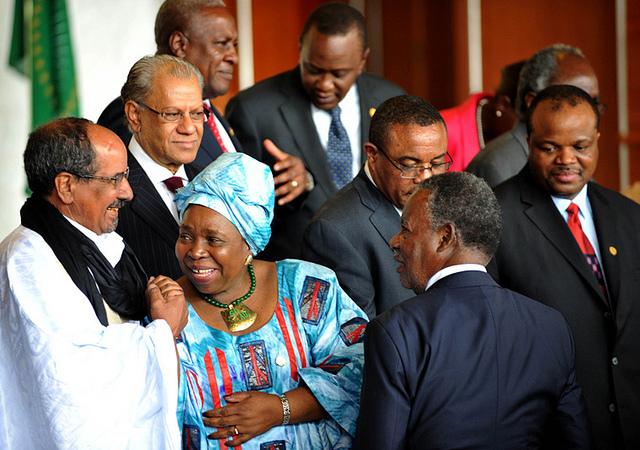Unless there are meaningful changes to the AU structure, the Chair of the Commission will remain a largely irrelevant bureaucrat, whoever it is.

Outgoing AUC chair, Nkosazana Dlamini-Zuma, mingles with AU heads of state in 2013. Credit: GCIS.
When Nkosazana Dlamini-Zuma was appointed as the new Chair of the African Union Commission (AUC) in 2012, expectations were sky high. The former South African minister was widely respected, and optimists pinned their hopes on the experienced technocrat revolutionising the affairs of the dysfunctional AUC.
4 years later and Dlamini-Zuma’s first term is now coming to an end. She will not be running for a second term and the process to find a replacement is underway, with the decision soon to be made at the African Union (AU) Summit in Kigali, Rwanda, from 10-18th June.
As ever, there are demands that the very best candidate for the job is found. However, once again, it doesn’t actually matter. It ought to. But as long as the current structure of the AU remains in place, it will make little difference who the next chair is. Dlamini-Zuma wasn’t able to transform the AU and neither will her predecessor, not unless significant changes to the organisation are made and the chair’s inbuilt powerlessness is remedied.
[See: The choice for the next African Union chairperson is too important to get wrong]
Under assembly
Unlike the European Union, which has which its own binding rule-making institutions such as the Parliament and Commission, the AU is essentially an intergovernmental body. This means that the real decision-making powers of the organisation are exercised by member states, and it is the AU Assembly − composed of heads of state and government − that is the primary authority.
Few or no powers are transferred to the AU Commission to exercise any real authority beyond drafting policies. It has no institutional authority to implement the organisation’s directives or sanction member states that have failed to comply with organisational rules.
Even when it comes to the make-up of the Commission, it is the AU Assembly that picks the deputy chair and eight commissioners that complete the secretariat. These officials’ roles are to support the Chair, yet the Chair is not permitted to nominate or assign portfolios to them. This remains a function of the Assembly, and the Chair has no official power to reassign, reshuffle, or fire any of the commissioners.
There is also a constraining lack of clarity regarding the relationship between the AU Chairperson (who is appointed for a one-year term from amongst serving heads of state or government) and the AUC Chair. In an illustrative debacle in 2005, for example, then AUC Chair Alpha Omar Konaré appointed an envoy to mediate in the crisis in Togo. However, Olusegun Obasanjo, the AU Chairperson at the time, soon declared the appointment void, seeing it as an act of insubordination.
This incident re-emphasised the extent to which the AUC Chair is subordinate to the Assembly and has to seek prior consent before exercising even some of the position’s official functions.
When Dlamini-Zuma was appointed, there was hope she would crack the whip and reform the ineffective AU Commission. But any optimism was illusory, and as she departs there has still been no meaningful change in the position.
Empowering changes
If the next AUC Chair is to be a success therefore, it will require much more than just finding a competent and effective technocrat to take the outgoing leader’s seat. It will require plenty of innovative thinking regarding the position itself and how it can be strengthened. There are several changes that could significantly bolster the role.
In the matter of appointing and assigning Commissioners, for instance, the Chair could be required to make recommendations regarding the nominations of these important officials. He or she could then be granted the prerogative of assigning portfolios and potentially reshuffling the Commission.
The Chair could also be awarded the power to enter into strategic agreements with member states that are willing and able to implement AU policies. He or she might also be given the authority to intervene or prescribe remedial measures in instances of non-compliance or when additional assistance is needed by member states.
In the context of implementing Agenda 2063, for instance, there could be a system whereby member states could sign a declaration agreeing to submit a periodic report to the AUC, allow the Commission to be part of implementation processes, and give the Chair the authority to make binding recommendations on addressing gaps.
Regarding regional matters, the Chair (or an appointed envoy) could also be given the authority to be involved in national processes that have a direct relation to regional integration matters. For example, the AU could adopt a policy that endows the AUC to be part of national committees responsible for national development plans and for it to be able to monitor processes that are linked to matters relating to AU plans such as harmonisation of immigration, trade, youth empowerment and gender representation.
Rather than just focusing on the individual who will take over from Dlamini-Zuma next month, it is crucial that the structural impotence of the AUC Chair itself is addressed if whoever comes next is to able to assert any kind of meaningful authority. Unless there are serious changes the status quo, even the best successor imaginable will remain a largely irrelevant to Africa’s regional integration.
Babatunde Fagbayibo is an Associate Professor of Law at the University of South Africa in Pretoria